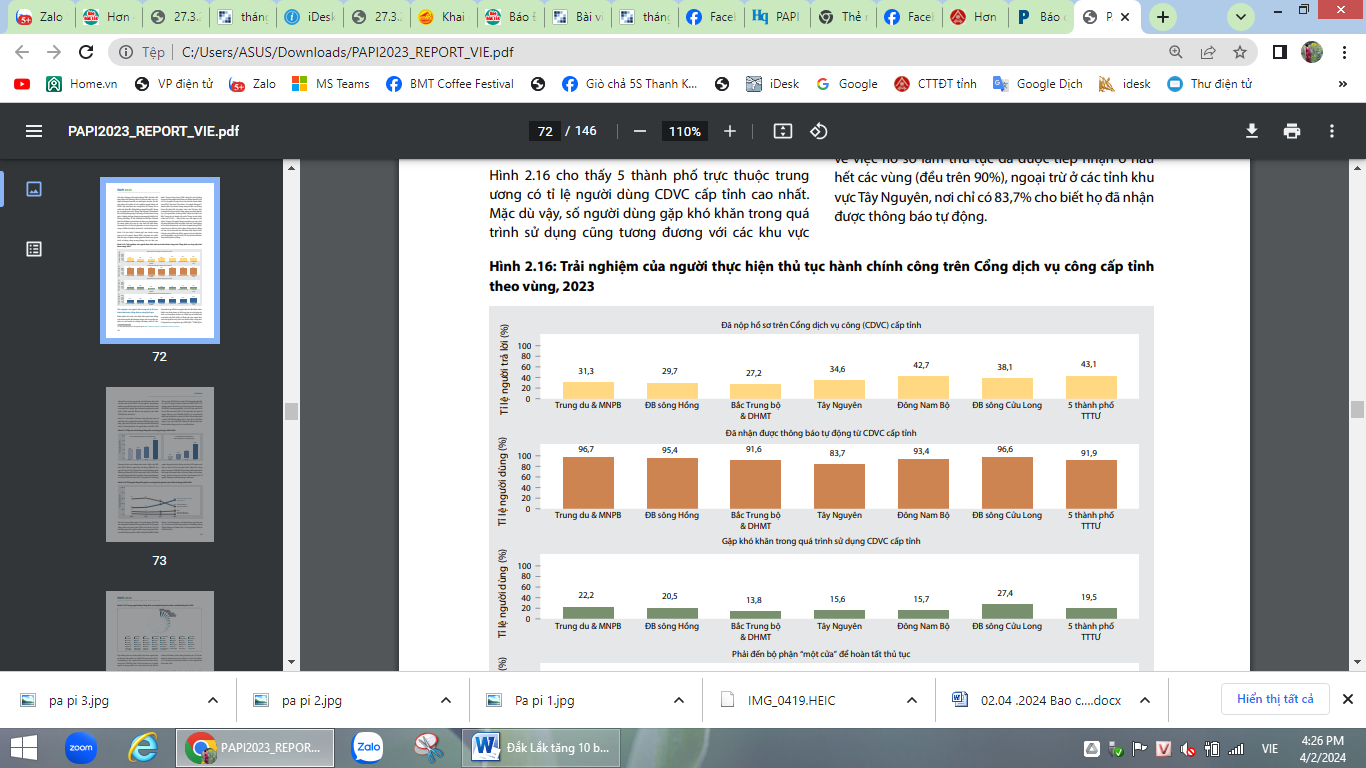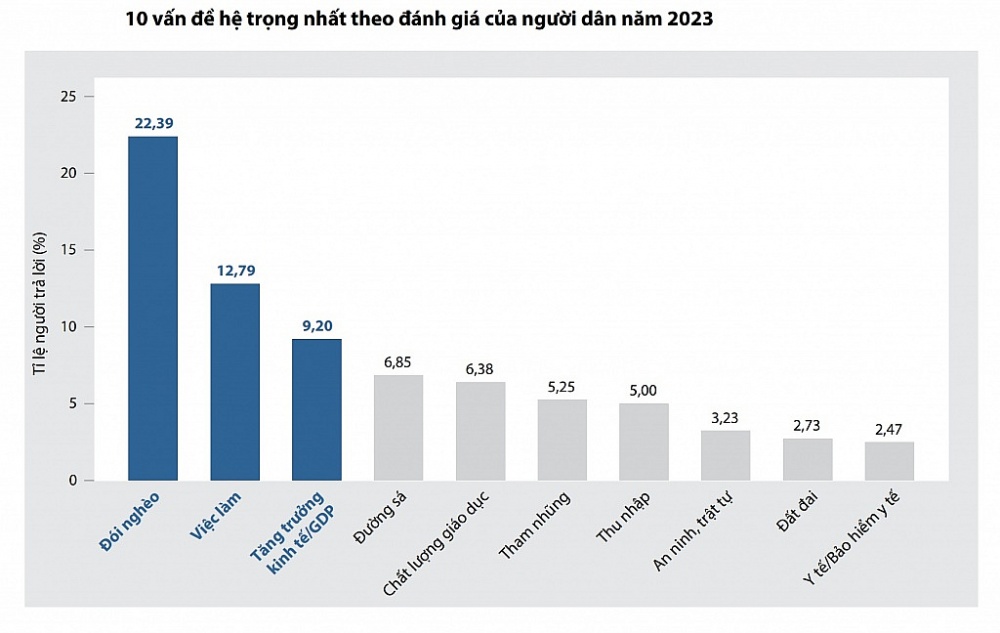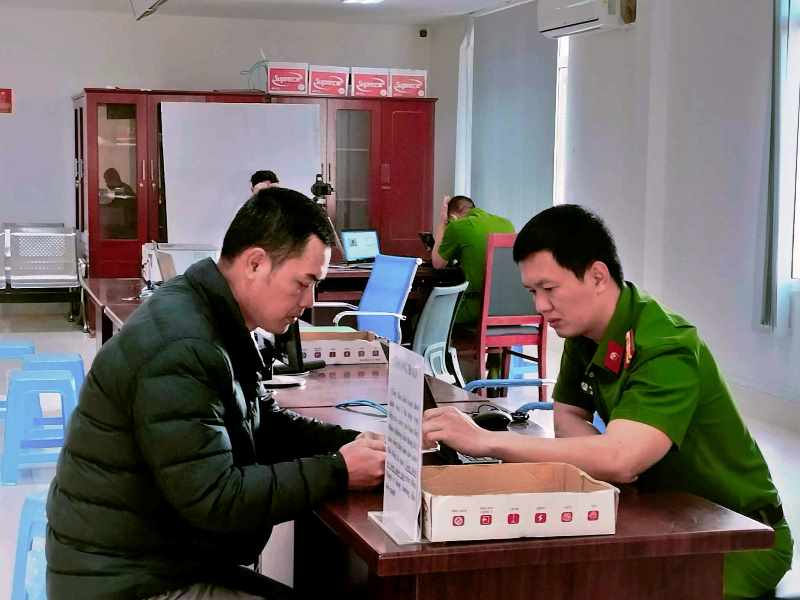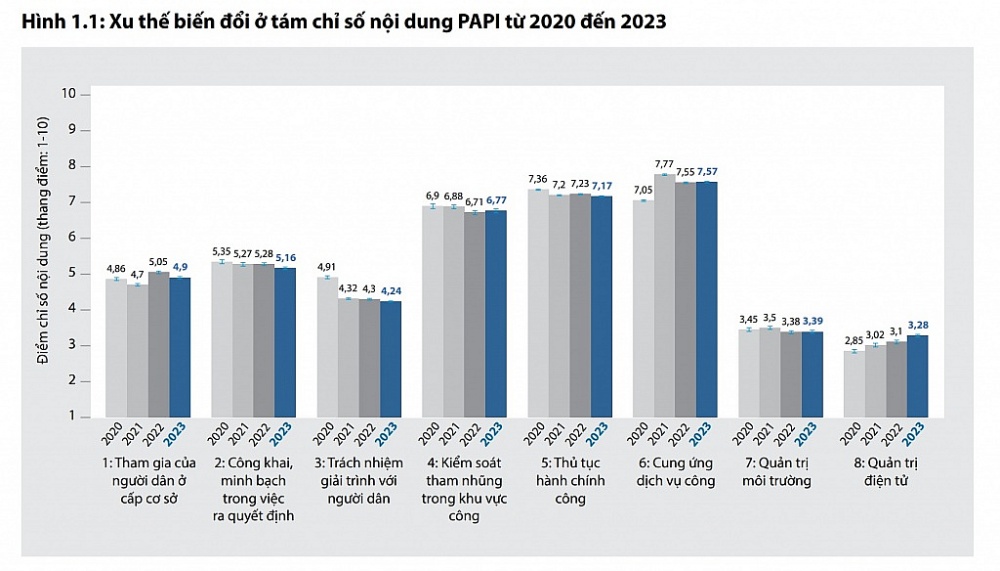On April 2nd, in Hanoi, the United Nations Development Program (UNDP) in Vietnam, in coordination with the Center for Community Development and Support (CECODES), organized a conference to announce the Provincial Governance and Public Administration Performance Index (PAPI) for the year 2023.


Source: PAPI Report 2023
According to the report released, Dak Lak Province achieved a PAPI score of 42.3265 points in 2023, ranking 31st out of 61 provinces and municipalities, marking an increase of 1.2042 points and a rise of 10 places compared to 2022. It ranked 1st out of 5 compared to other Central Highlands provinces (Dak Lak: 31; Lam Dong: 45; Gia Lai: 51, Kon Tum: 56; Dak Nong: 61).
Specifically, the province saw improvements in several criteria compared to 2022: Transparency (2022: 4.8389; 2023: 5.3089), Accountability to citizens (2022: 4.1477; 2023: 4.2091), Control of corruption in the public sector (2022: 6.3898; 2023: 6.6173), Public service delivery (2022: 7.4912; 2023: 7.5422), Environmental governance effectiveness (2023: 2.9834; 2023: 3.2489), and E-governance (2022: 2.8875; 2023: 3.417). However, two criteria saw a decrease in points compared to 2022: Grassroots participation (2022: 5.1388; 2023: 4.7562) and Administrative procedures (2022: 7.2450; 2023: 7.2269).
PAPI is an important research program on governance initiated by the United Nations Development Program in Vietnam since 2009. The PAPI index measures and compares citizens' experiences and perceptions of the effectiveness and quality of policy implementation and public service provision by local authorities in 63 provinces and municipalities in Vietnam, aiming to promote effective governance and proactive responsiveness to citizens' needs. Over the past 15 years, a total of 197,779 citizens nationwide have participated in the survey.

Source: PAPI Report 2023
The PAPI index measures 8 content criteria: grassroots participation; transparency; openness and transparency in local decision-making; accountability to citizens; control of corruption in the public sector; administrative procedures; public service delivery; environmental governance; and e-governance.
Leading the PAPI ranking in 2023 is Thua Thien Hue Province (with a score of 46.0415); Dak Nong is the lowest-scoring province (with a score of 38.9711); two provinces not evaluated are Quang Ninh and Binh Duong.

The criteria for public service delivery in Dak Lak Province in 2023 show significant improvements.
In her opening remarks at the ceremony, UNDP Resident Representative in Vietnam, Ramla Khalidi, stated that the PAPI 2023 report gathered opinions from nearly 20,000 citizens in 63 provinces and municipalities of Vietnam, the largest number of survey participants to date in the PAPI index survey.
According to Ms. Ramla Khalidi, there are three notable findings in the PAPI 2023 survey results. First, citizens' satisfaction with anti-corruption efforts in the public sector at the local level has improved, which is a commendable progress. However, Ms. Ramla Khalidi also noted that citizens still have concerns about some anti-corruption indicators in areas such as recruitment; transparency in local decision-making...
The second finding is the increased access of citizens to e-governance compared to 2022. PAPI 2023 data shows an increasing trend in the proportion of citizens using national and provincial electronic information portals, although the overall figure is still low.
Ms. Ramla Khalidi, UNDP Resident Representative in Vietnam, noted that comprehensive access to e-services requires narrowing the digital divide, particularly focusing on ethnic minority groups and rural populations.
The third finding is the most concerning issues for citizens in 2023. Accordingly, the three issues that citizens believe the State needs to focus on in the coming year are poverty (accounting for 22.39% of total respondents), employment (12.79%), and economic growth (9.2%).
Ms. Ramla Khalidi, UNDP Resident Representative in Vietnam, emphasized that these concerns reflect the need for the State and local authorities to pay attention, understand, and formulate policies for vulnerable groups, areas, and communities at risk of being left behind in Vietnam's rapid economic development process.
Kim Bao
- Dak Lak proudly received the First Class Labor Medal from the Government of the Lao People's Democratic Republic. (07/06/2025, 18:07)
- The 33rd Expanded Conference of the Dak Lak Provincial Party Committee. (07/06/2025, 18:04)
- Leaders of the two provinces of Dak Lak and Phu Yen attended a ceremony to pay tribute and inaugurate the statue "Uncle Ho with Border Guard Soldiers." (21/05/2025, 08:02)
- Implement solutions to ensure growth targets, organize organizations and agencies in alignment with the merger of provincial administrative units. (16/05/2025, 08:13)
- The program honors 15 exemplary team members who have effectively implemented the five teachings of President Ho Chi Minh. (16/05/2025, 08:06)
- Many beauty queens and supermodels will participate in the Vietnamese Brocade Fashion Program – Dak Lak 2025, scheduled for May 17. (16/05/2025, 08:00)
- The organization of public consultations, as well as input from various sectors and levels, regarding the draft resolution to amend and supplement a number of articles of the 2013 Constitution. (09/05/2025, 08:06)
- Vice Chairman of the Central Committee of the Vietnam Red Cross Society Vu Thanh Luu visits and presents gifts to Vietnamese Heroic Mothers. (09/05/2025, 07:59)
- The People's Committee of Dak Lak Province signs a record of discussion for cooperation with KOICA Vietnam. (08/05/2025, 08:04)
- The delegation of the People's Committee of Dak Lak Province visits and extends New Year's greeting to the governments of Attapeu and Sekong. (08/05/2025, 07:59)
- Dak Lak grants the investment approval decision for the Veston Textile - Garment Center Project. (09/04/2025, 15:39)

